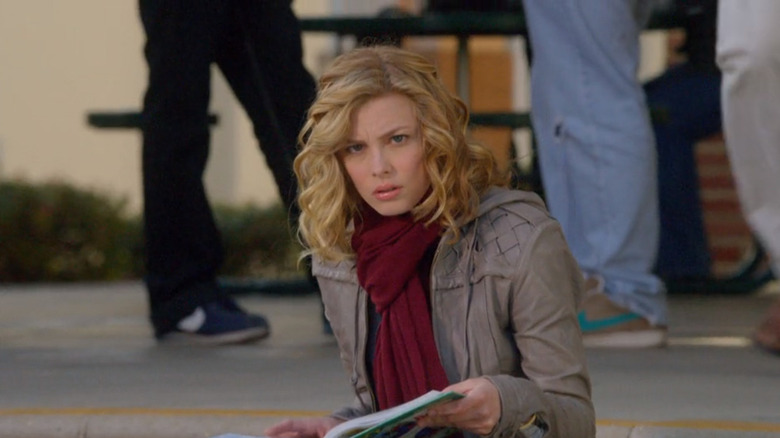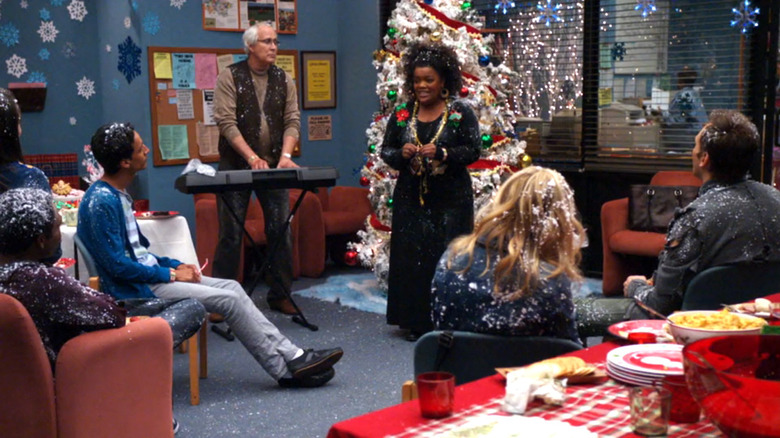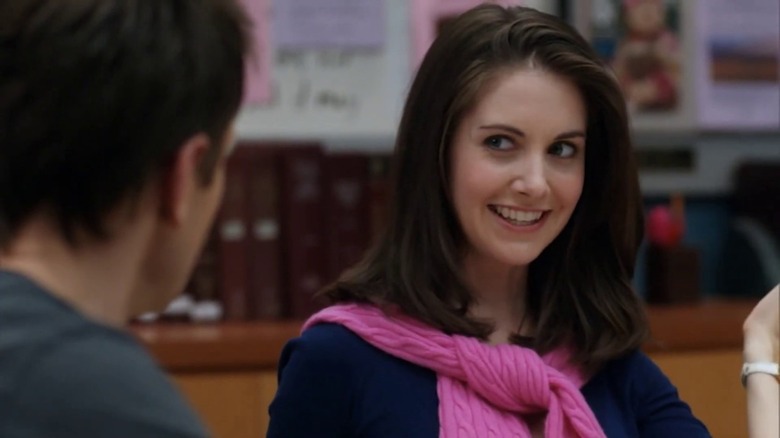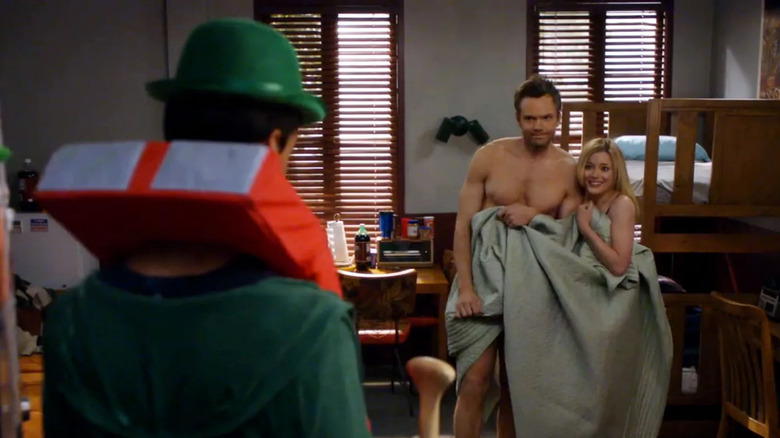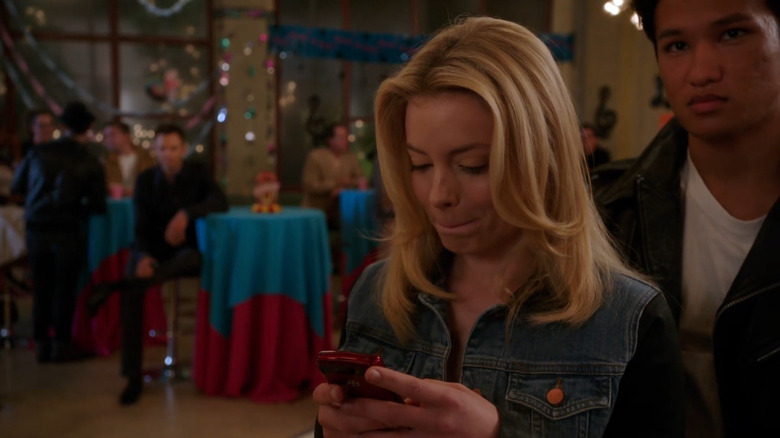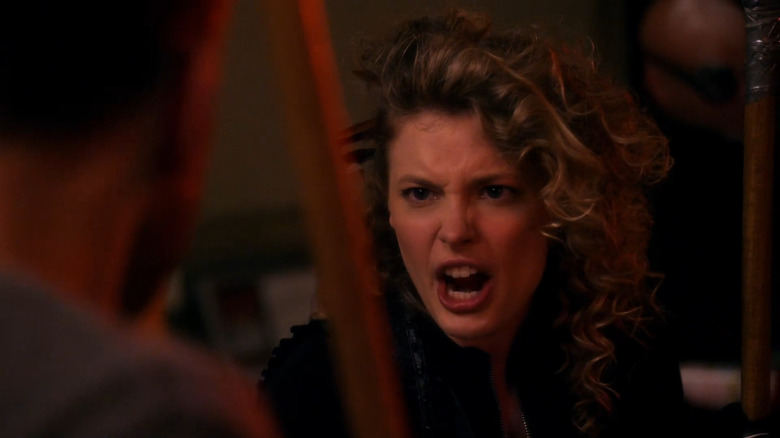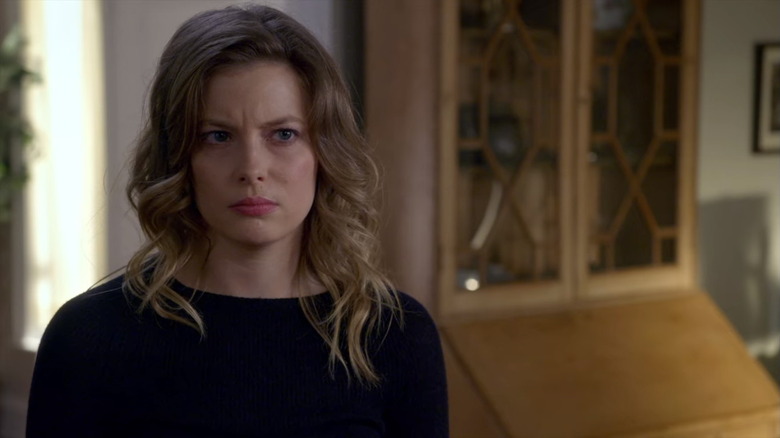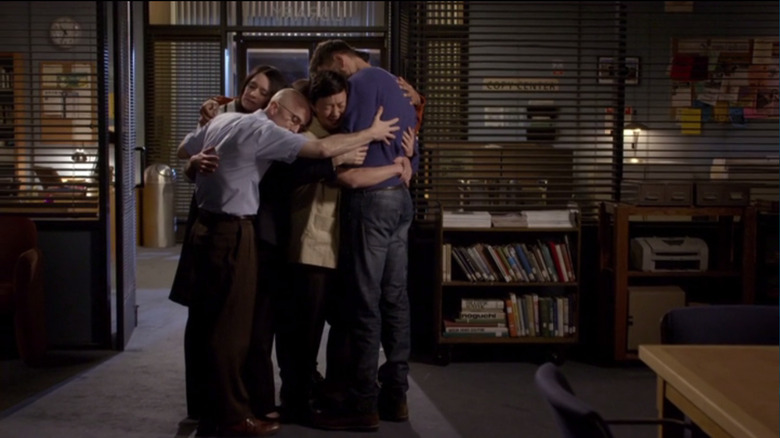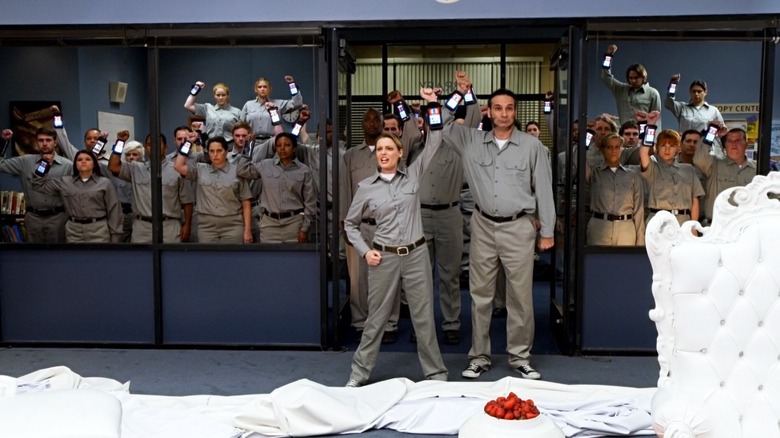How Britta Went From Being Community's Best Character To The Worst
Although it's common for sitcom characters to turn into caricatures of themselves over the show's run, what happened to Britta Perry (Gillian Jacobs) over the six seasons of "Community" is something else entirely. Introduced as a smart, cool woman who was the only member of the study group capable of recognizing Jeff's sleazy ways, she later gets described in season 5 as "the group's airhead."
By the time the final season came along, Britta had not only become firmly established as the group's punching bag, but had also suffered a clear downgrading in terms of the show's most important characters. Whereas season 1 had Britta as the show's second-most important character, often portraying the rest of the group from her and Jeff's (Joel McHale) perspective, season 6 Britta was given about the same level as importance as the Dean.
So, how and why did this happen? How did Britta become "the worst," and was it the right decision for the show?
The pilot
The Britta we see in the first episode is as close to a perfect person as anyone on this show is ever going to be. While not completely impervious to Jeff's manipulations, she repeatedly turns the tables on him without ever being cruel to him or anyone else in the group. Her "sorry, I lied," moment near the end is a highlight, as it's the first time in the show Jeff realizes he's not going to be able to talk himself out of a situation.
Most notably, the pilot establishes Britta as Jeff's intellectual equal. At the very least, she's within the same range. While everyone else in the group are wacky one-dimensional characters who'd only be fleshed out over time, Britta and Jeff are the ones showing self-awareness from the start. Much like how "The Office" centered Jim and Pam as the two of the only normal people in a cast full of crazies, the pilot gives us Jeff and Britta as the only two people grounded enough to conceivably function in the real world.
It's not that difficult to imagine a version of "Community" where this basic dynamic stayed the same. After all, characters like Pam from "The Office" or Carla from "Scrubs" mostly maintained their roles as the straight man in a cast full of wise guys. But the group dynamics on "Community" were always evolving, and Britta starts to change as early as episode 2.
First half of season 1
The second episode of the show, "Spanish 101," introduces Britta's first proper character flaw: she's all talk when it comes to her political activism. She mentions that journalists are being killed in Guatemala, and it's pretty clear she's saying this less out of genuine concern for Guatemalan journalists and more to seem smart and worldly to the other study group members. Unfortunately for her, Shirley (Yvette Nicole Brown) and Annie (Allison Brie) are immediately energized at the injustice and want to do a protest to raise awareness. As Britta's put off by their enthusiasm, Shirley calls her out bluntly, "Somebody has a case of 'use fringe politics to make themselves feel special but doesn't ever do anything'-itis."
Britta realizes they're right and decides to join their protest. Although the episode portrays Britta as being in the wrong and needing to change, it's still a storyline that places her as the central character. When she calls Shirley and Annie's protest methods "tacky" and "lame," we're meant to at least somewhat agree with her, and she's an object of sympathy as she reluctantly goes along with the protest. While later seasons would show Britta going all-in on a protest while the other characters roll their eyes, "Spanish 101" expects its audience to roll their eyes with Britta, not at her.
While those first 10 episodes or so gradually introduce more and more flaws to Britta, she's still looked up to by the rest of the cast. The Christmas episode features her giving a monologue to Shirley about how she needs to stop giving the other characters guilt trips all the time, and it's portrayed as a moment of helpful wisdom. In later seasons, Shirley thinks of Britta as more of a loser hippy freak, but this Shirley genuinely listens to what she has to say and changes her mind as a result.
The problem so far
On rewatch, it's always nice to see Britta be cool and clear-headed, but this changes quickly. The problem was that she wasn't considered to be particularly likable as a character, with even those in the writers' room finding early Britta annoying.
There was also the fact that her and Jeff's will they/won't they shtick felt a little phoned in. They had chemistry, sort of, but "Community" was always better suited for the cartoony, high-concept storylines like their mafia movie parody or their first paintball episode, "Modern Warfare." As the show veered more in that direction, Jeff and Britta's budding romance felt more like something forced by the network rather than an organic part of each character's development.
The moment that really spelled doom for Britta's prospects on the show was the season's ninth episode, "Debate 109," in which "Community" seemed to accidentally stumble upon the realization that Jeff and Annie worked really well together. There was the problematic age gap between them that made the couple shy away from acting on their feelings, but from this episode forward, it seemed clear that Jeff and Annie were the show's endgame couple, not Jeff and Britta. As the show slowly stopped treating Britta as Jeff's romantic foil, no one seemed to know what to do with her instead.
Annie's rise, Britta's fall
Perhaps one of the saddest indicators of Britta's fall from grace is the way her relationship with Annie evolves. Season 1 Annie is fresh out of high school, very naïve and trusting, and constantly turns to the older Britta for advice. In "Romantic Expressionism," Britta apologizes to Annie by saying, "I guess we feel like we're sort of all a family, and Jeff and I are like your Greendale parents."
Fast forward two seasons and all of Annie's respect for Britta is gone. In season 3's "Competitive Ecology," Annie's calling Britta stupid in front of the entire group, and the show itself is on Annie's side. "If loving worms is dumb, I don't want to be smart," Britta says, and Annie responds incredulously, "It is! And you can't be!"
The vaguely parental relationship between them is fully reversed in "Origins of Vampire Mythology," where Annie spends the episode keeping Britta's phone away from her so she won't call her ex-boyfriend. By season 6, Britta is living on Annie and Abed's (Danny Pudi) couch, often unable to pay her rent, and Annie will not hesitate to make it clear how little she respects Britta for this. Often Britta will be making some political point and Annie will cut her off with a disdainful, "Pay your rent, Britta." It sounds harsh, but because Britta is now characterized as a lazy, stupid freeloader, we're not really meant to see Annie as a jerk in these moments.
More notable than their changing relationship is the changing prominence of the two characters. By the time we hit season 3, Annie is firmly established as Jeff's main love interest, and therefore the main female character of the show. When Annie interacts with Britta, the scene tends to be written more from Annie's perspective. Whereas seasons 1 and 2 often had Britta at the center of its most serious storylines, now it's Annie who gets all the meaty material.
Season 2 Britta
Described in the Dungeons & Dragons episode as "needlessly defiant," season 2 of "Community" has Britta in an interesting place. She's not as well-respected among her peers as she once was, but she still feels like the secondary leader of the group. In "Cooperative Calligraphy," she holds her own in multiple intense arguments against Shirley and Annie. She may be characterized as abrasive and overly passionate, but she isn't the group's airhead just yet.
Season 2 also features one of the last moments of Jeff and Britta feeling distinct from the rest of the cast, as "Paradigms of Human Memory" has them defending themselves after the group finds out they've been secretly hooking up all year. The episode ends with the two mutually agreeing to stop sleeping together, and they comfortably spend the rest of the season as friends.
One common fan interpretation of Britta's arc is that she starts the show as a guarded person, putting on a persona of someone who is way more put together than she actually is. As she grows more comfortable with the group, she feels like she's able to open up and really be herself around them, even if it means getting made fun of every now and again or having people like her less than they used to. This is a pretty realistic, understandable direction for the show to take for the character ... one that is completely undermined by the season that comes next.
Season 3
In a Reddit AMA thread back in 2013, showrunner Dan Harmon responded to the idea that Britta had been dumbed down, saying:
"I don't perceive the character as being dumbed down, I think we evolved her into one of the most sophisticated characters in TV comedy. Britta's pop cultural ignorance ("rowboat cop") and the fact that she dropped out of high school and ain't so well-read are human qualities to which I found a lot of women relating and/or joyfully not relating, but in any case BELIEVING ... I did find myself telling the writer's room here and there, 'let's not make her a dumb blonde, she's a high school dropout and she's computer illiterate and she's a late bloomer because she's lived a fuller life, but there's a difference between that and an airhead.' If we made her an airhead, it was an accident, or an isolated instance of us being too tempted by a funny joke.
Judging only from season 2, this explanation would be perfectly plausible. However, it's hard to watch season 3 of "Community" — arguably the show's best — and believe that making Britta an airhead wasn't the writers' intention. This is the season where the characters start using her name to mean making a dumb mistake, where her choice of major is routinely mocked and dismissed by her friends. It's the season where she "saves the day" in the Christmas special by being so bad at singing (and so absurdly lacking in self-awareness about it) that she single-handedly derails the Glee coach's plans.
It's a funny moment, and it's admittedly kind of sweet how the gang stands up for Britta ("Hey, you do not get to call Britta the worst," Troy says to the coach), but man, does it highlight how much Britta's changed from the first Christmas episode. She's gone from effortlessly being able to change Shirley's mind in a major way to singing "me so Christmas me so merry" because she thinks those are the correct words to the song.
Season 4
Although season 4 is widely (and correctly) considered the worst of the show, it's also the season that pulls away from making Britta the show's punching bag. As much as Jeff mocks her for trying to get a psych degree, Britta's successful at using what she's learned in her psych classes to get him to open up about his father issues.
"Herstory of Dance" not only gives Britta a win at the end, but it also has Pierce (Chevy Chase) call out Jeff for the way she's been treated. When Jeff argues she was acting crazy, Pierce responds, "Yeah, but what choice did she have? You make fun of her, you use her name as a synonym for screwing up. Cut her some slack, Jeff."
This is also the season that features her getting into a relationship with Troy. It's underdeveloped and doesn't last long, but she handles the break-up gracefully. Plus, considering Troy called her "a pizza burn on the roof of the world's mouth" the season before, it's nice to see a version of him that actually cares a little bit about her feelings.
The show doesn't completely let her off easy here: it's ninth episode ("Intro to Felt Surrogacy") features the "shameful revelation" that Britta has never voted before. Although there are plenty of understandable reasons for someone with Britta's leftist, anti-establishment political leanings to not want to vote, the show attributes this fact to mere laziness. When Britta asks if they still respect her as a political activist, Jeff carefully answers, "The level to which we respect you as a political activist has definitely not changed." Because Britta is dumb now, she finds this answer reassuring.
Season 5
Although season 5's not the show's best season, it might be the most impressive. With Chevy Chase officially gone and Donald Glover leaving the show five episodes in, this season should not have been as good as it was. Instead, season 5 kept going strong, even after two of its biggest characters were gone.
It also showcases Britta more favorably than she'd been portrayed in years. She's the unsung hero of "Geothermal Escapism," helping Abed move on from his best friend leaving. During her final scene with Troy, she calls herself the worst, the term people on the show have used to describe her since late season 1. Troy corrects her and says "You're the best." (There was not a dry eye in the room!)
Season 5 also features one of the few moments where Britta's political activism is portrayed as good thing, even as the show realizes the circumstances behind her activism are ridiculous. "App Development and Condiments" has the whole school devolve into a dystopian wasteland due to an app that allows people to rate other people. (Yes, like that "Black Mirror" episode, but "Community" did it first.) Not only are Britta's concerns about the app vindicated, but she also successfully runs a revolution that destroys the class system the app created.
It's silly, sure, but after years of Britta's political activism being portrayed as hollow and borderline fraudulent, it's refreshing to see her get a win. Even when she does get treated poorly in season 5, (like when her old activist friends basically call her a loser and laugh at her as she walks away), the scenes are now firmly rooted in her perspective. It feels like we're expected to feel bad for her as she's being laughed at, rather than go along with it.
If the show had ended in season 5, Britta's character arc wouldn't have been too bad. She'd be an example of a character who was flanderized throughout the first three seasons, then gradually returned to something resembling her original form. Unfortunately for Britta, there was still one more season to go.
Season 6
The way Britta treated in the final season can best be summarized by a throwaway scene in "Grifting 101," where the ensemble is talking about signing up for a class. "Who's in, and can you cover me? I'll pay you back!" Britta says to the group enthusiastically.
Annie responds with the same enthusiasm: "I will get it from your parents." Britta responds, "I will pay you back," and Annie says, "At which point, I will pay back your parents." Still excited, Britta says, "Which will be never!" and then puts her hand up for a high-five, which nobody gives her. "I will get a high-five from your parents," Annie says.
The joke here is that Britta has become so unreliable that they all know she'll never pay them back on anything, so they go to her parents for reimbursement on all the money she owes them. Earlier in the season, it was revealed that Britta's parents are rich and have been paying for her stuff behind her back. Britta's appalled when she learns all this, but still allows them to keep paying her debts.
It's the old cliché of the champagne socialist; Britta may have radical left-wing political ideals, but the show makes the implicit argument that this is only because she has rich parents who shield her from the real-world financial costs that the rest of us have to deal with. Later in that scene, Abed gives the same "I'll get it from your parents!" response and Britta responds, "Tell them I spit on their wealth!" The line is delusional and clearly hypocritical, and throughout the scene the other characters seem to look at her with a sad mix of disgust and pity. Considering how she's treated here, it's crazy to think the show originally wanted us to think Britta was cool.
The finale
It's not just that Britta was portrayed as a total trainwreck of a person that made her season 6 arc so terrible, but how she was rendered increasingly irrelevant. In "Basic Crisis Room Decorum" she soils herself early on and the characters aren't even particularly surprised; they're just annoyed in a way that implies this has happened before. She then doesn't do anything of importance in the rest of the episode.
Although you'd think Britta would get more focus after the departure of even more major characters, she's instead overshadowed by the introduction of Frankie (Paget Brewster) and Elroy (Keith David). In one of the show's biggest missed opportunities, the writers chose not to have Britta replace Professor Duncan as the school's psychiatrist, which would've both justified her continued participation at Greendale and followed up on her consistent seasons-long goal of getting a psych degree. Instead, she ends up as a bartender, which isn't inherently bad, but is clearly not what she wants to do with her life.
The finale centers around Jeff struggling to deal with the departures of both Abed and Annie. Abed's leaving for a job as a TV production assistant, and Annie's leaving for a job in the FBI. What is Britta doing? She's sticking around as a bartender, with no expectation of her life changing any time soon. How does Britta feel about this? The show doesn't care. The worst part happens near the very end, when Jeff is dropping Abed and Annie off at the airport, with Britta nowhere in sight. Why isn't Britta saying goodbye to them too? She's (supposedly) been their close friend for six years straight, but the only focus here is on how Jeff feels.
Why Britta's still the best
I never stopped liking Britta, even as the other characters started treating her like Meg from "Family Guy." Even when the show itself didn't seem to want me to root for her, I found myself doing exactly that. Maybe it's because, as much as the show seems to want us to think of her as clueless, or pretentious, or completely incompetent, she does tend to be right about most things. She's right that the study group is hiding behind frivolity when Troy's leaving in "Geothermal Escapism," and she's right about Jeff's desire to reconnect with his father, even if she's wearing a slice of ham as she says it.
In a way, her character can be summed up by that scene in season 3 where Jeff mocks her for not knowing what an analogy is. "I know what an analogy is!" she snaps at him. "It's like a thought with another thought's hat on." As much as that sounds silly and as much as Jeff clearly wants to make fun of her for it, he begrudgingly concedes that she's basically got the right idea.
Although her IQ certainly varies a lot over the series, the one defining trait of Britta is her relentless optimism and her love for the other characters, even when they don't really deserve her love. She's always trying to help, always trying to do the right thing, even as the world of the show punishes her for it over and over again. Britta still kind of works as a character, even in seasons 3 and 6, because the show begrudgingly seems to understand, on some level, that's she not really the worst after all.

